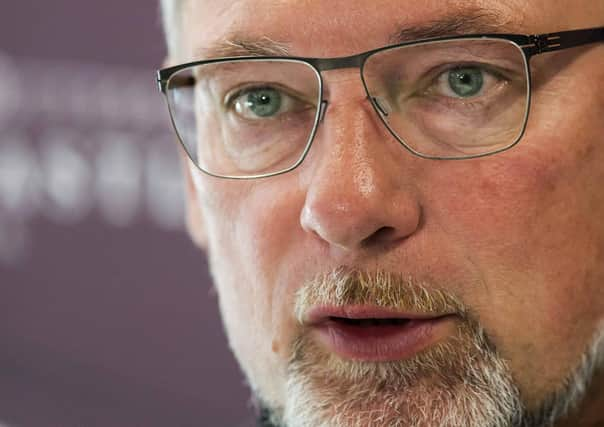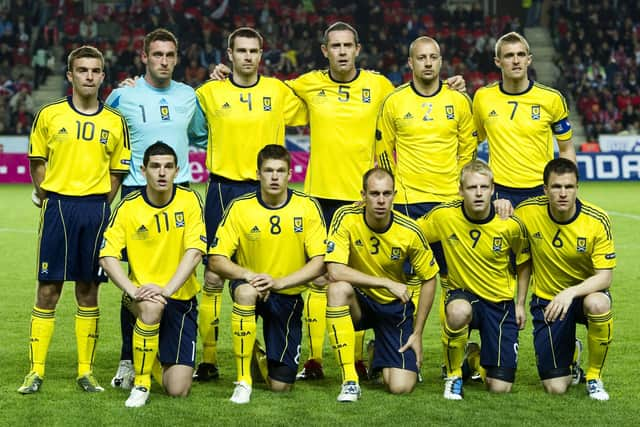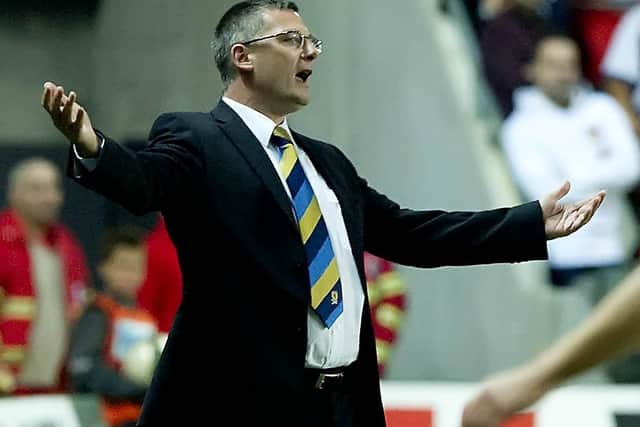Craig Levein laughs off 4-6-0 criticism and blames player for ‘throwing toys out pram’


Some memories hang about like plastic bottles in a landfill; you can pack them down but they are still there, refusing to disintegrate and disappear. Which is why, a decade on from former Scotland boss Craig Levein’s failed attempt to engineer a point against Czech Republic, he is still unable to escape the detritus of that defeat.
Playing in Prague, he was convinced that a draw would be enough to aid Scotland’s ambition of Euro 2012 qualification and that a starting line-up of 4-6-0, although unusual, would be the best way to achieve that.
Advertisement
Hide AdAdvertisement
Hide Ad“I honestly didn’t realise at that time that it was such a significant moment and that everyone was going to talk about that system for as long as they have,” said the former national manager. “But here we are, ten years later, still talking about it. For me, that seems strange but I have long since accepted it.”


There has been significant time to mull that decision over. And, good reason.
Like every campaign since France 98, that qualifying quest ended in dismay, the dropped points to Czech Republic proving costly as they finished second in the group, behind Spain, and booked their place at Scotland’s expense.
But, for all the criticism, Levein does not regret his choice that night in Prague. “Look, I didn’t invent that formation. It was used by managers before that game and has been used since. I have no problems being criticised because it didn’t work the way I intended but I just have to laugh that I’m the one who is always associated with it.”
In recent games Celtic boss Neil Lennon is the latest to forego a traditional striking focal point, relying on Ryan Christie to push on. But he has been spared the same level of abuse.


“For me, that system works,” maintains Levein. “As a centre-back, playing against a striker who is much deeper, it is really difficult because you don’t know when to push out or sit in and I was hoping to catch them by surprise and maybe sneak a goal on the counter attack. To get three points would have been fantastic but, and this was the first time I had ever done it, I felt a draw would be good enough and would put us in a good position in the group.”
The plan of presenting their hosts with something unexpected was sabotaged, though, when the starting line-up and formation were leaked to the media, in an act Levin only half jokingly refers to as treason.
While Steven Naismith and Jamie Mackie were included in the team, there was no recognised No 9, meaning that Steven Fletcher didn’t even make the matchday squad and was left sulking in the stand, while Kenny Miller, anticipating his 50th cap, was also furious to be restricted to a substitute role.
Advertisement
Hide AdAdvertisement
Hide Ad“One of the things I thought we had in our favour was an element of surprise but that was ruined by a player throwing his toys out of the pram. That was a real annoyance for me on the day of the game.
“The Czech Republic were a decent team but I thought that if we could just prove hard to beat and get a draw then, job done! But I also had an issue when it came to strikers. The only one in any kind of form who could play up there on his own was Kenny Miller and I just couldn’t make my mind up if I was going to play with one striker or go down this other path. I knew I could always put strikers on the bench in case we needed to go and chase the game at any point, so, no, I didn’t think there would be such a outcry.”
Sitting in a hotel bar, reminiscing without emotion or rancour, he says he can still see the logic of his decision, even if others steadfastly refuse. Producing a notebook, he flicks through the pages to point out the notes made as he watched Lithuania take on Czech Republic prior to Scotland making that trip and raised the idea of the “strikerless” formation.
“I found this the other day, believe it or not,” adds Levein. “At that time I don’t think the squad had been selected so that was me just messing around.
“The reason I picked the system I did was that I had watched their games and their full-backs were advancing on a regular basis and I felt we could get in behind them and get a goal on the counter attack. The notes show that they were going forward with seven players and leaving themselves exposed at the back and the idea was that we could exploit that.
“The logic was sound. I thought it could work. It didn’t and I take full responsibility for that but how many times have Scotland gone abroad and been beaten 1-0, 2-0, 3-0? It was another defeat but I tried to do something and it’s not as simple as saying if we had attacked we would have won. People keep saying that but would we though? Or, would we have lost 3-0? We will never know.
“I suppose, I knew that going with that system could be a risk. But I believed that it was the right thing to do, I still do. Although, if you are asking if I would change anything with hindsight, I would probably put another man on the player who scored from the set piece!”
In the aftermath of that loss Fletcher turned his back on playing for Scotland and David Weir later revealed that the strikers had not been the only ones shocked and frustrated by the formation or tactics.
Advertisement
Hide AdAdvertisement
Hide Ad“None of the other players ever said anything to me. But as players you go out and do as the manager tells you so I have to take full responsibility. I have never shirked that.”
But as national boss the defeats, he explains, always hurt more than any criticism that followed. The Scotland job was one that tugged at his heart strings and fed on his patriotism. He had looked up to Alan Hansen as a youngster and had fulfilled his dream of representing his country, going on to play at the Italia 90 World Cup as he racked up 16 caps before injuries curtailed his playing career.
Now, as Scotland return to the Czech Republic for their next Nations League fixture, Levein is just another Tartan Army footsoldier, watching from the sidelines, and hoping that the latest man to take on the challenge of turning back the clock will have greater success than the half dozen determined triers who have preceded him.
He believes that Steve Clarke has the attributes that may yet deliver the holy grail of another major finals.
“The problem I had then, Steve finds himself having to deal with now, just as Gordon [Strachan] had to deal with. We don’t have a recognised world-class attacking player. That makes it so much more difficult. If all your strength is in midfield and defence then you should be better at defending than you are at attacking.
“I’m pretty sure there will be few games where we have 90 per cent possession. We just don’t have the quality of attacking player that can make the difference in these big matches, the ones that really matter and without that world-class No 9 you need to look for different ways of utilising what you do have.
“Steve is in a position where he is playing Lyndon Dykes, who up until a couple of seasons ago was playing in the Championship, and last year he played Lawrence Shankland who was in the Championship.”
Looking back, Levein recalls a head-to-head with Wales where his point was illustrated. “The only difference in that game was Gareth Bale and he did that constantly for Wales, he came up trumps. He could score out of nothing, without any help. That’s what we need. Steve’s teams are always really well organised and hard to beat but for us to score, particularly away to the Czech Republic, we need somebody to do something special unless we score from a set piece.”
Advertisement
Hide AdAdvertisement
Hide AdMichael O’Neill’s heroics with Northern Ireland showed that teams can punch above their weight but underdogs need to maximise their strengths to do that.
“A lot of his performances were backs against the wall and maybe one or two chances in the game,” added Levein. “But the conversion rate was spectacular. But even then, they had Kyle Lafferty when he was flying. I wouldn’t say Kyle was a top, top-class striker but he could finish in big games.
“I think Scotland, as much as people want it to be a team that plays attacking football, all on the ground, pass and move, that is difficult without the players.
“I have done the job, before me George Burley did the job, Alex McLeish, Berti Vogts and everybody has struggled. I don’t think of my record as any worse than anyone else’s. But we do need a manager who is organisationally really good and defensively really good and, for certain, Steve is that, so I’m hopeful that he can make us difficult to beat and get some results. I think that’s what we are going to have to do.
“I don’t see us dominating possession or winning games 4-0, do you? But there is absolutely zero tolerance from the media and the punters. We are living in the past. People who grew up with us qualifying for finals expect that still. It is the same with Aberdeen, their fans still remember the Fergie years and Dundee United fans still remember the Jim McLean era. They expect success and it is completely different now.
“I actually feel for Steve, The spotlight is on him but he hasn’t got the tools he really needs. I’m not saying we can’t win, of course we can, and I really, really hope we do, but to have any kind of sustained progress we need better players. That’s just my opinion.”
If anyone knows how to survive the scrutiny of the punters and the media, it is Levein. He may have been ousted in 2012, but he has managed to withstand the whirlwind of emotions and frustrations and still takes a stoical view of his tenure and that night in Prague.
“That doesn’t define my Scotland career, not for me and other people have the right to think what they like. It’s water off a duck’s back to me.
Advertisement
Hide AdAdvertisement
Hide Ad“I made a decision very early in my managerial career not to let it get to me. I was at Cowdenbeath and we had a game at Queen’s Park and there were a group of about seven Cowdenbeath fans chanting ‘You’re not very good!’ I was getting annoyed and wanted to shout about the budget and tell them how difficult things were behind the scenes and ask if they could do any better but then I thought ‘what are you doing?’
“At the end of the day, people go to matches because they want to support their team and see their team winning. If the team doesn’t win then someone is getting stick. That invariably falls on the manager. I have learned not to take the bait or get upset. There’s no point because you just find yourself having an argument when in actual fact, you both want the same thing. Deep down you both just want the team to win so it is stupid to get involved.”
Which is why he has learned to respond as honestly as he can when questioned about that night in October 2010.
“Did we play well in the Czech Republic game? I’m not so sure we played well but we only lost the goal to a set piece, which I was really annoyed about because we had been pretty good at dealing with set pieces. Outwith that we weren’t really under a lot of pressure in the match.
“But, the thing about international football is that there is nothing else on at the time. It creates a situation where everything is highlighted. There is no other football to offer a distraction, all the focus is on you. That is part of what happened and maybe goes some way to explaining the amount of light that was shone on the whole thing.
“Even when we were preparing to play Spain in the next game, which was quite a big thing, people were asking about the Czech Republic. I remember thinking it was strange to still be answering questions about that game. Little did I know!”
Some memories, even those long since consigned to landfill, have a much longer life cycle than others.
A message from the Editor:
Thank you for reading this story on our website. While I have your attention, I also have an important request to make of you.
Advertisement
Hide AdAdvertisement
Hide AdWith the coronavirus lockdown having a major impact on many of our advertisers - and consequently the revenue we receive - we are more reliant than ever on you taking out a digital subscription.
Subscribe to scotsman.com and enjoy unlimited access to Scottish news and information online and on our app. With a digital subscription, you can read more than 5 articles, see fewer ads, enjoy faster load times, and get access to exclusive newsletters and content. Visit https://www.scotsman.com/subscriptions now to sign up.
Our journalism costs money and we rely on advertising, print and digital revenues to help to support them. By supporting us, we are able to support you in providing trusted, fact-checked content for this website.
Joy Yates
Editorial Director
Comments
Want to join the conversation? Please or to comment on this article.